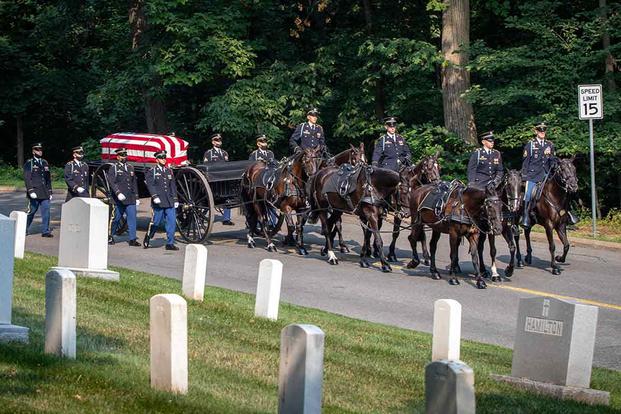The Army's Caisson platoon -- a ceremonial horse unit that has transported fallen troops to their final resting place at Arlington National Cemetery for decades -- plans to shut down starting May 1 for 45 days to prioritize the health of the herd, an Army spokesperson told Military.com Friday.
The Army said the "suspension" will not impact military honors at the cemetery.
The suspension follows four equine deaths in the platoon over the last year-plus and comes amid efforts from the unit and millions in funding from Congress to rectify poor living conditions for the horses.
Read Next: Troubled Ohio Guard Has Seemingly Failed to Conduct Key Oversight of Its Units for Years
Two sources familiar with the unit's operations had told Military.com this week that the Army was planning on suspending operations as early as next week.
Military.com asked Military District of Washington public affairs officials about the decision on Thursday, and following Army deliberations that stretched into Friday, the service said plans had been finalized to begin the closure in May.
"In coordination with the Military District of Washington and the 3rd U.S. Infantry Regiment [The Old Guard], the Army's Caisson Platoon -- which employs military working horses as escorts during funeral honors at Arlington National Cemetery -- will implement a 45-day suspension of caisson horses to prioritize the health of the herd," Lt. Col. Terence M. Kelley, a spokesperson for the Army, told Military.com via email Friday.
"As a result of this difficult decision, [Arlington National Cemetery] is contacting families with funeral services that include the support of the Caisson Platoon or the caparison horse to inform them that this element will temporarily be unavailable starting May 1," he added. "The Army is working on interim solutions, including alternative horse-drawn conveyances and contracting caisson services from outside organizations."
CNN reported that two horses died in February 2022 and that the herd was living in small, unsanitary lots covered in more than a dozen inches of excrement. They were also eating low-quality hay.
The two horses that died, Mickey and Tony, appeared to have suffered from intestinal issues that may have caused their deaths; Tony had nearly 44 pounds of sediment in his colon.
Over the last year, the 3rd Infantry Regiment or "the Old Guard," the Army's premier ceremonial unit to which the Caisson unit belongs, has attempted to make improvements to lots and pastures that the horses live and train in.
Last year, the unit said it spent nearly $2.5 million on improvements; the unit received $15 million more in funding after Congress became involved in the effort, passing improvement provisions in this year's National Defense Authorization Act, according to Senate Appropriations documents.
Some of those changes, the unit has told Military.com, included testing the hay for quality and placing feeding mats so that horses do not accidentally ingest gravel off the ground.
In the midst of these efforts, two other horses died, totalling four in nine months.
The third horse, Rio, an older horse, died of surgical complications after he suffered a left limb fracture last March. He underwent three surgeries to attempt to fix the injury, but passed seven months later in October after veterinarians determined he would be euthanized for quality-of-life purposes.
The fourth horse, 14-year-old Rambler, died a month later of "acute abdominal distress;" it is unclear if it was caused by sediment in his gut as the unit was waiting for necropsy results at the time. Horses can die from an ailment called "colic," a general term for abdominal pain that can vary in severity and pain for the animal.
The Old Guard said that Rio's and Rambler's passings were unrelated to the previous deaths.
One of the larger hurdles for the unit has been finding adequate space for the herd. Last year, Army veterinarians assessed that they were living in less than 20% of the recommended space for a herd that size, though the herd was slightly larger then than it is now.
Since last year, the size of the herd has decreased by roughly 15%. Some of the herd has been adopted out of the unit, which helps with available land, but also means fewer horses are responsible for carrying out funeral duties.
This closure is not the first disruption this year. In January, the unit closed its stable to the public for a month to "minimize spreading a contagious [to other horses] upper respiratory bacterial infection that was found in" one of the horses; final military honors still continued, according to the unit's Facebook.
Military.com reported in December that the Army would begin rotating up to 12 of the roughly 50-herd horses to Bureau of Land Management-owned land near Lorton, Virginia, as part of a short-term solution for finding the equids more space.
"This temporary pause will be conditions-based, and will not impact military honors, dependent honors services or any other military funeral honors elements," Kelley, the Army spokesperson, said. "We look forward to the return of U.S. Army caisson horses performing their sacred duty of escorting our nation's heroes to their final resting place. As information becomes available on the health of the horses, updates on the availability of caisson funeral support will be shared on the ANC website."
-- Drew F. Lawrence can be reached at drew.lawrence@military.com. Follow him on Twitter @df_lawrence.
Related: Army to Start Rotating Arlington Horses to Bigger Pasture Following Deaths












